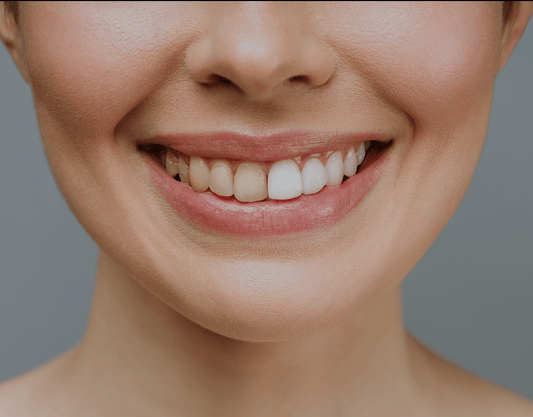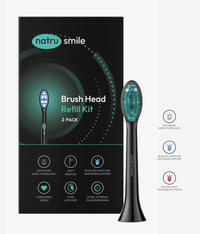
All products are certified by dental expert Dr. Greg Grillo
When you spend time whitening your teeth, it can be disappointing to discover they’re still not as white as you imagined.
Whether it’s due to genetics, lifestyle habits, or other factors, there are several explanations for why teeth look more yellow after whitening. Nevertheless, this doesn't make the experience any less frustrating.
Thankfully, there are steps you can take to make even the most stubborn yellow stains disappear. Armed with an understanding of why your teeth aren’t whitening and some tips to combat those issues, you’ll have the smile of your dreams in no time.
Why Are My Teeth Still Yellow After Whitening?
We often associate yellow teeth with braces or poor hygiene; however, could teeth whitening be another culprit? There are several reasons why your teeth look more yellow after whitening, but the most common are genetics and staining.
Genetics
Some people have naturally yellower teeth than others, and this can make it difficult for whitening treatments to take effect. Genetics can influence the thickness of your outer layer of tooth enamel. The underlying dentin layer is usually a yellow hue, and if you have thin enamel, this color tends to be more noticeable.
While some teeth whitening options work better than others, it is best to keep in mind that this is a natural occurrence and your teeth are normal regardless of their yellowish hue.
Staining
Most likely, if your constant plight is "my teeth are still yellow after whitening," it's because you drink a lot of coffee and tea.
This yellow discoloration caused by these drinks is harder to remove than other types of stains because of tannins, which are a kind of polyphenol or element present in plant-based foods that dissolve when mixed with water. These tannins attach to the enamel on your teeth and form yellowish stains over time.
Similarly, if you smoke cigarettes or use tobacco products regularly, this can also lead to stubborn yellowing of your teeth even after whitening treatments. You may also notice a yellow tongue coating.
Damaged Enamel
If you find your teeth getting more yellow even after whitening, it may also be because of damage to the enamel. The dentin within your teeth has a yellow hue, and as the enamel wears away, it can expose the dentin and cause discoloration.
Whitening your teeth more if they are damaged in this way can lead to even more harm, so it’s important to consult a dentist if you think this might be the case. However, if the issue is simply staining or genetics, another round of whitening may be just what you need.
How To Prevent Yellow Teeth After Whitening
Whether you’ve recently whitened your teeth or are planning to whiten them soon, there are a few things you can do to make sure your pearly whites stay pearly long-term.
These tips can be helpful, but if you are having trouble in the long-term or start to notice intense sensitivity, you should talk to your dentist.
Avoid Staining Foods And Drinks Such As Coffee Or Wine
Coffee, wine, and even darkly colored soft drinks can all stain your teeth over time. Avoiding these foods and drinks can help keep stains at bay.
If you do decide to indulge in these, make sure you're regularly brushing your teeth to prevent build-up. You can also try drinking with a straw or use toothpaste specifically designed for stain removal.
Quit Smoking
If you’re a smoker, chances are the stains on your teeth are caused in part by the smoke. Quitting smoking can help prevent further discoloration and may even help reverse some of the yellowing you’ve already experienced.
The reason that smoking causes persistent yellowing of the teeth is because of the tar and nicotine—both of which are difficult to remove with regular brushing.
The tar from smoking can give teeth a darker stain, and nicotine combined with oxygen can cause yellowing of the enamel due to tiny pores that allow the substances to seep in.
Maintain Healthy Dental Hygiene Habits
Brushing your teeth twice a day and flossing once a day are key when it comes to keeping your teeth white. Over time, plaque can build up on the surface of your teeth, causing them to be yellow.
It only takes 24 hours for the plaque on your teeth to calcify, meaning it can't be removed without a dental hygienist. The tools you used to keep your teeth clean and healthy are equally important.
A soft-bristled toothbrush and fluoride toothpaste are ideal for removing plaque because they are gentle enough not to damage the enamel of your teeth.
In addition to flossing and brushing, regular dental checkups are important to keep your teeth white and healthy. Your dentist will be able to tell you if you need a professional cleaning or whitening treatment.
Drink Plenty Of Water
Water helps to keep your teeth healthy by washing away food particles that can lead to staining. It also keeps your mouth hydrated, which is important for keeping it clean and preventing decay. Being dehydrated can cause your saliva to become thicker and less effective at neutralizing and washing away bacteria.
If you are drinking coffee or tea throughout the day, rinse your mouth out with water afterward. This will help reduce the amount of staining that occurs on your teeth. Getting enough water also helps to keep your overall health in check, so it shouldn't be skipped.
Keep Up With Regular Dental Cleanings
If you think your teeth are yellowing, it's important to get a professional cleaning. A dental hygienist will be able to remove the tartar and plaque that built up on your teeth over time. This will help keep your teeth looking white and healthy for longer.
Regular cleanings can also help prevent further discoloration from occurring in the future. Your hygienist can flag any underlying issues that might be contributing to your yellow teeth. They'll also be able to recommend any treatments or lifestyle changes you might need to make in order for your teeth to stay white.
Do your teeth look more yellow after whitening? Get rid of yellow teeth and find more answers with these key points.
Why Won't My Yellow Teeth Whiten?
At-home teeth whitening methods such as whitening strips and toothpastes can be successful at getting rid of surface-level stains on your teeth. However, if you want to remove more deeply embedded discoloration or colored dentin, a professional teeth whitening service from your dentist is necessary. Natural teeth whitening won’t work well enough in this situation.
How Long Does It Take To Whiten Yellow Teeth?
The dentist may recommend using whitening toothpaste and brushing twice per day for two to six weeks. A certified whitening mouthwash might take up to three months to show changes. Whitening strips provide the most effective home treatment lasting up to six months.
In the dental office, it may take between 30 minutes and an hour and a half for a professional teeth whitening procedure. One or more appointments may be needed in order to get your teeth as white as you want them to be, depending on how deeply they are stained.
Can Some Teeth Not Be Whitened?
If you have veneers, dentures, implants, composite tooth-colored fillings, or have undergone cosmetic bonding, then teeth whitening treatments may not be suitable for you. This is because some dental work restorations won't lighten, and the end result could look very patchy.
Can Badly Yellow Teeth Be Whitened?
If your teeth have taken on a yellow hue and you want to restore their original white color, you may be wondering - can yellow teeth be whitened? Thankfully, there are several options available. Talk to your dentist about the right course of action for you depending on how discolored your teeth are and what kind of results you're looking for.
Is It Too Late To Fix Yellow Teeth?
Whitening your teeth is an effective way to give yourself a boost of confidence and happiness, no matter how old you are. If your dentist approves, you can improve your smile at any age.
For more dramatic whitening, professional-grade treatments can be used that penetrate deep into the enamel layers in order to remove even stubborn stains caused by years of drinking coffee or tea.
Will My Teeth Ever Be White Again?
At-home whitening products work well to remove minor surface stains from teeth. If the discoloration is more severe, consulting with a dentist is recommended for stronger treatments that will lighten and brighten your smile.
Keep in mind that certain internal stains can be tougher to remove, so professional treatments may be necessary, including multiple treatments.
Is Teeth Yellowing Permanent?
Yellow teeth don't have to be permanent. It's possible to whiten them and also maintain proper oral hygiene habits that keep them looking healthy. The length of time the teeth have been discolored also affects how easily they can be restored back to their natural color.
How Do You Deeply Whiten Your Teeth?
An at-home teeth whitening kit typically contains a bleaching agent called carbamide peroxide, which can remove both deep and surface staining and even change the natural color of your teeth.
If your bright white smile has been dulled by coffee stains, these kits are an effective way to restore it. Some kits also come with a gel containing peroxide that you brush onto the enamel of your teeth.
At-home whitening kits can be used on a regular basis, up to once every four to six months.
Why Do Teeth Take So Long To Whiten?
The results of tooth whitening will generally appear after the initial 24 hours. If you opt for an at-home whitening kit, it may take longer to achieve the desired effect since these products contain a lower concentration of bleaching agents. In most cases, it can take up to three weeks to observe the outcome you are hoping for.
When discussing teeth whitening, it is essential to understand that the necessary level of bleaching depends on the severity of tooth discoloration.
Why Are My Teeth Yellow When I Brush Them Every Day?
Without you being aware of it, certain foods and drinks that are high in tannins may cause your teeth to become yellow. Coffee, citrus juices, soft drinks, teas, berries, tomato-based sauces and soy sauce are among the many tannin-rich foods and drinks that can discolor teeth.
How Long Does It Take For Yellow Teeth To Turn White With Toothpaste?
It may take between two and six weeks for whitening toothpaste to achieve its intended results. In some cases, the discoloration of teeth extends beyond the outer layer of a tooth, requiring professional-grade whitening procedures only available through a dentist.
Final Thoughts
Teeth whitening is a great way to brighten your smile and boost your confidence.
Although it is possible for teeth to become yellow over time, even after teeth whitening, factors such as diet, lifestyle habits, age, and genetics can contribute to the yellowing of teeth.
With proper oral hygiene practices and the right dental procedures, you can keep your pearly whites looking their best for years to come.










